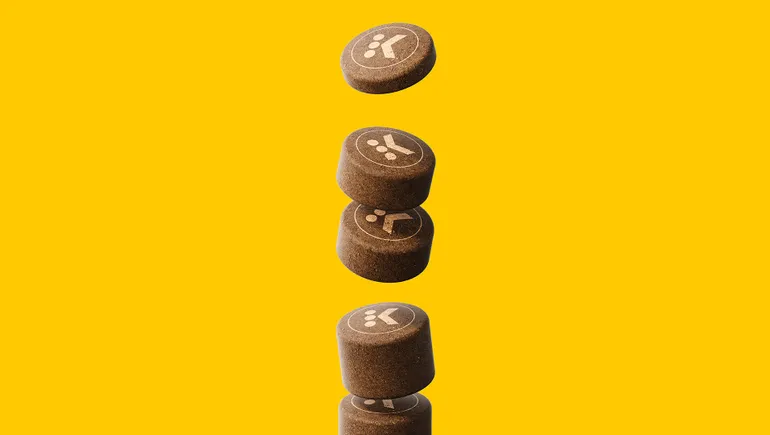Keurig brewing up compostable K-Rounds as alternative to plastic coffee pods

Dive Brief:
- Keurig Dr Pepper announced Wednesday that the future of its single-serve coffee pods includes plant-based, potentially compostable K-Rounds, an alternative to its polypropylene K-Cups.
- The rounds consist of coffee grounds “pressed and wrapped in a proprietary, protective plant-based coating preserving the coffee’s flavor and aroma, eliminating the need for plastic or aluminum,” the company said. They will come in different sizes and be compatible with Keurig’s still-in-testing hot and cold drink brewing machine called Alta.
- Keurig will continue to sell plastic K-Cups, with the company reporting 45 million homes across the U.S. and Canada already have Keurig brewers that take existing pods. Keurig is launching a mail-back program later this year for consumers who cannot recycle the products locally but said it is not yet ready to unveil recycling partners or other program specifics.
Dive Insight:
Keurig machines debuted in 1998, going on to disrupt at-home and in-office coffee brewing with single-serve K-Cups. In recent decades the notorious pods have been a subject of environmental criticism and a target for innovation.
Notable milestones have included Keurig declaring at the end of 2020 that all of the K-Cups it produced were recyclable, and in 2022, Keurig agreeing to a $10 million class-action settlement of a 2018 lawsuit alleging Keurig Green Mountain misled consumers about the true recyclability of K-Cups.
In the company’s sustainability report released last year, it said it had begun lightweighting K-Cups, reducing plastic packaging in each pod by about 18%. The company also offers a reusable filter for use in Keurig brewers.
Competitors have also sought to take actions that improve sustainability: Another key player in the at-home brewing market, Nestlé’s Nespresso, has a mail-back program for its aluminum pods.
K-Cups are not going away — but the company has spent “a number of years” developing this new solution, according to Phil Drapeau, senior vice president of future coffee systems at KDP.
The coating for the rounds are made up of four food-grade components, the primary being alginate, typically derived from seaweed, Drapeau said. Keurig is working with TUV on certifying the rounds as compostable. As a result of the coating, the rounds hold their shape even after brewing so the company says there’s no mess for consumers.
“They can just take that pod and they can dispose of it like they would any coffee grounds,” Drapeau explained. “We would love it if consumers put it in the compost; it can go into their garbage, they can take it out into their backyard and break it up and spread the coffee grounds out there.”
The rounds will only be an option for consumers who buy a new Alta brewing system. Keurig said that in developing the system, it acquired licensing for technology invented by Delica Switzerland, through which Keurig has exclusive rights to use and build on the technologies for consumers in the U.S., Canada and Mexico.
Drapeau attributed the need for this systems approach to the variable sizes for single or double-shot espresso, regular coffee and more, “one of the hallmarks of the K-Rounds.”
“As we’ve kind of broken free from the constraints of the K-Cup pod and the plastic elements, now we have the ability to actually vary the size of those pods themselves. We then have to match that to create the different styles of beverages that we want,” Drapeau said.
As for whether the compostable rounds could ever be available to consumers who own an existing Keurig machine, “I would never say never, but our focus right now is on really developing and delivering the best possible experience we can for the K-Rounds in the Keurig Alta,” Drapeau said.
Each round will be marked with a code that the Alta brewer reads to determine the pressure and “extraction profile” required for a certain beverage. Drapeau said the company is still looking at “a couple different technologies” for creating those codes, including in laser etching and food-safe printing.
The company is still determining what the secondary packaging for the rounds will be, but expect all of it will be recyclable.
There is not a date for when the Alta brewer and K-Cup will be commercially available. The scope and length of the beta testing period is currently open-ended but could begin in fall 2024. The innovation announcement comes as CEO Bob Gamgort described the at-home coffee category as “sluggish” during Keurig Dr Pepper’s most recent earnings call.
Source: fooddive.com

